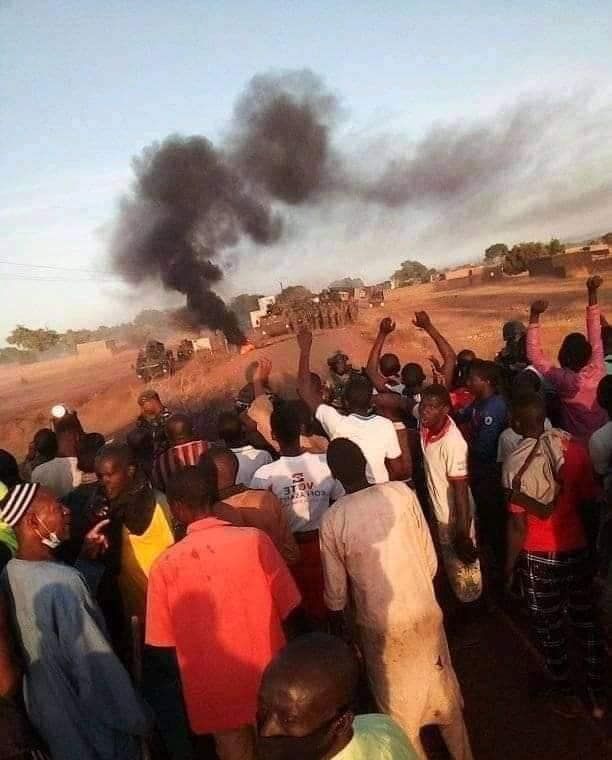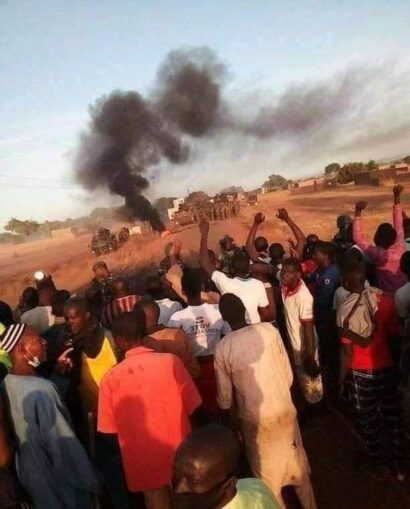

Near Tera in western Niger, the progress of a French military convoy was blocked by demonstrators protesting against the presence of France in the Sahel. Credit: Abidjan TV
After two weeks of struggle — burning barricades, smashed windows and mirrors, Molotov cocktails, masses of people on the road, attempts to seize the trucks — the logistics convoy that the French army had organized at the port of Abidjan, Côte d’Ivoire (Ivory Coast), in the middle of November finally reached Gao, Mali, at the end of November.


Near Tera in western Niger, the progress of a French military convoy was blocked by demonstrators protesting against the presence of France in the Sahel. (Credit: Abidjan TV)
The 1,100-mile trip took much longer to complete than usual because of “unexpected” resistance, according to Captain François Xavier, in command of the convoy. (France24 video)
An eight-minute video, filmed in western Niger, shows bands of youth smashing windows and mirrors on a military truck, masses of people blocking the road, armored personnel carriers firing a missile at a house, hundreds of protesters scattered across barren fields throwing rocks and cops from Niger firing tear gas on the crowd. Three protesters died in Niger, and a number were seriously wounded.
According to France 24 news channel, this was the 32nd convoy bound from Abidjan to Gao since the French military Operation Barkhane began in August 2014. This convoy comprised between 60 and 100 vehicles. Some of the vehicles are military; others are heavy trucks, buses and construction equipment.
The intensified hostile reception to the convoy along the way has caused the French army and the French government to question how to maintain the presence of the French army in this area in western Africa, which is part of the region known as the Sahel.
The United States, the world’s leading imperialist power, has formally agreed to let France take the lead in military presence in the western Sahel. (Department of Defense press release, Oct. 21) But the U.S. is spending over a quarter of a billion dollars on a CIA drone base currently being built in central Niger. The U.S. has placed sanctions on some of the major business leaders in Mali. But these actions have not restrained the hostile mood of the masses.
For one week of this trip, the convoy made its way with great difficulty through Burkina Faso, lying between the Côte d’Ivoire and Niger. For years after Blaise Compaoré led a coup against Thomas Sankara, Africa’s Che Guevara, in 1987, Burkina was a reliable puppet “ally” of French imperialism.
The resistance to the passage of the convoy, along with the recent ongoing trial of the army officers who assassinated Sankara, shows that these ties are being dramatically challenged.
The protests in Burkina Faso were organized by militants, who communicated by using the internet over mobile phones. This tactic was so effective that the Burkinabe authorities shut the mobile internet down for four days until local businesses, which rely on that communication for sales, registered protest. The Burkina Faso government tried closing schools, but that resulted in more students taking to the streets.
Besides the neocolonialist presence of the French army and its convoy, one of the main issues raised by the Burkina Faso protesters was the failure of their government to defend local communities from attacks by reactionary Islamic forces. These attacks have produced tens of thousands of internally displaced refugees.
The attacks of reactionary Islamicist forces in Mali, Niger and Burkina Faso have been a major propaganda point used by France and its U.S. ally to justify their military presence. A very persistent rumor among those protesting is that the convoys carry arms to some Islamicist groups that the French want to support.
Though the French have been quick to deny and to discredit these allegations, political analysts who followed the U.S. war in Afghanistan remember well that the U.S. armed some reactionary Islamicist groups there in order to attack and destabilize pro-socialist and left-democratic governments.
Mali, Niger and Burkina Faso are among the poorest countries in the world, landlocked, with roads that even if paved are in extremely poor condition, and with the barest minimum of internet communication systems.
But progressive forces in these three countries are currently mounting a militant struggle against imperialism. Progressive forces worldwide should be alert for ways to send meaningful solidarity.
This statement was recently issued by over 30 groups. On Friday, March 28, Dr. Helyeh…
When Donald Trump announced massive tariffs on foreign imports April 2, Wall Street investors saw…
The century-long struggle to abolish the death penalty in the U.S. has been making significant…
Download the PDF May Day appeal to the working class Revolutionary change is urgent! Gaza…
Philadelphia On March 26, the Pennsylvania Supreme Court denied political prisoner Mumia Abu-Jamal permission to…
There are two important and overlapping holidays on April 22: Earth Day and Vladimir Lenin’s…